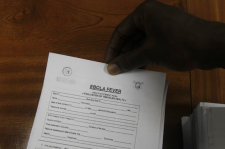 There is no hotter topic in the news these days than the Ebola outbreak. We would say that it has gone viral, but that would be beneath us.
There is no hotter topic in the news these days than the Ebola outbreak. We would say that it has gone viral, but that would be beneath us.
Opinions and reactions range from the end of the world to absolutely nothing to worry about.
We thought it might be a good time to examine some of the different opinions and advisories, as well facts, unknown facts and suppositions. If this puts us out of sync with the CDC, it would not be the first time we ve had a problem with CDC Director, Dr. Tom Frieden.
Following are a collection of talking points, facts, and opinions, taken from a variety of sources. Also discussed is the preposterous method of determining who should and should not get on that plane possibly the most disturbing issue of all.
Q; What is the real risk of outbreaks in the US and other countries with modern medicine and effective infection control procedures?
A: This is still unknown, but more will be known shortly, probably this week. Given the typical 8-9 day incubation period of of the infection, if someone who was exposed to Duncan is going to become ill, it will likely be in the near future (see timeline below). Unfortunately, sometimes it can take up to 3 weeks for the infection to manifest itself, so those exposed to him may need to be under observation for that length of time.
Q: Are we really prepared?
A: Depends on who you ask. For example, Dr. Tom Frieden, head of the CDC said several days ago, That s how you stop it in its tracks. We re confident we won t see a large number of cases from this.
Yet, events would seem to call this into question: Thomas Duncan entered the US already infected on Sept 20th. On Sept 24th he begins to show symptoms, and was then contagious. Yet, it was not until Sept. 29th, when Duncan was taken to Texas Health Presbyterian Hospital for the second time that the CDC was first notified. Around October 1st, it is reported that five children in four schools may have had contact with Duncan during this time. It is estimated that 100 people may have been exposed.
Q: How likely is it that the infection will spread in the US?
A: Dr. Anthony Fauci, a pioneer in the early fight against AIDS in the head the Allergy and Infectious Diseases Institutes at the National Institutes of Health, has a different take. On CBS's "Face the Nation" yesterday, Fauci said: It's absolutely possible that one of Duncan's contacts will get sick in the coming days. I would not be surprised if one of the people who came into direct contact with Mr. Duncan when he was ill will get Ebola. You can't say. You can't put a number on it. It's impossible to do that. But there certainly is a risk."
Q: Can people who are traveling from countries that are suffering from the epidemic be tested before they get on the plane?
A: Yes but what is being done now is essentially worthless. Current screening involves a questionnaire and taking people s temperature. Neither will provide any useful information, unless travellers can be relied upon to be truthful. But they have incentive to lie, so it is hard to imagine any value from the questionnaires. Also, fever is more likely to occur days after arrival than before departure, and a fever can be the sign of many infectious diseases, and can be reduced by aspirin or other similar drugs. And if the infected person is asymptomatic as was the case with Mr. Duncan, there will be no fever when he boards the plane. The idea of a questionnaire is a joke.
Q: Can the virus survive on surfaces, and if so, for how long?
A: According the The New York Times, this is unknown. They say, It s different in every set of circumstances
And, There s not one answer, but it is considered to be fairly safe after about 24 hours, certainly in environments that are cleaned regularly like hospitals. Forgive us if we are not carefree when we hear the term fairly safe. from public health officials.
Q: What about that ZMAPP treatment?
A: First, there is no evidence that it works. Second, it is gone. The company that developed the antibody treatment, Mapp Biopharmaceutical, of San Diego is not even remotely equipped to manufacture more than a few doses. Even with other companies getting involved, this will not be quick.
ACSH s Dr. Josh Bloom, who has had some problems with the competence of the CDC in the past, says, Right now, I don t believe anyone. There are differing opinions among experts, statements by government agencies not exactly known for accuracy and much speculation. The answers to these questions will develop in the coming weeks and months. There is no point in panicking. This will not be the end of the world, but it isn t a trivial matter either. Time will tell.